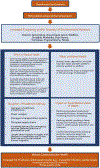Climate Change and Cardiovascular Health: A Systematic Review
- PMID: 38865135
- PMCID: PMC11366109
- DOI: 10.1001/jamacardio.2024.1321
Climate Change and Cardiovascular Health: A Systematic Review
Abstract
Importance: Climate change may increase the risk of adverse cardiovascular outcomes by causing direct physiologic changes, psychological distress, and disruption of health-related infrastructure. Yet, the association between numerous climate change-related environmental stressors and the incidence of adverse cardiovascular events has not been systematically reviewed.
Objective: To review the current evidence on the association between climate change-related environmental stressors and adverse cardiovascular outcomes.
Evidence review: PubMed, Embase, Web of Science, and Cochrane Library were searched to identify peer-reviewed publications from January 1, 1970, through November 15, 2023, that evaluated associations between environmental exposures and cardiovascular mortality, acute cardiovascular events, and related health care utilization. Studies that examined only nonwildfire-sourced particulate air pollution were excluded. Two investigators independently screened 20 798 articles and selected 2564 for full-text review. Study quality was assessed using the Navigation Guide framework. Findings were qualitatively synthesized as substantial differences in study design precluded quantitative meta-analysis.
Findings: Of 492 observational studies that met inclusion criteria, 182 examined extreme temperature, 210 ground-level ozone, 45 wildfire smoke, and 63 extreme weather events, such as hurricanes, dust storms, and droughts. These studies presented findings from 30 high-income countries, 17 middle-income countries, and 1 low-income country. The strength of evidence was rated as sufficient for extreme temperature; ground-level ozone; tropical storms, hurricanes, and cyclones; and dust storms. Evidence was limited for wildfire smoke and inadequate for drought and mudslides. Exposure to extreme temperature was associated with increased cardiovascular mortality and morbidity, but the magnitude varied with temperature and duration of exposure. Ground-level ozone amplified the risk associated with higher temperatures and vice versa. Extreme weather events, such as hurricanes, were associated with increased cardiovascular risk that persisted for many months after the initial event. Some studies noted a small increase in cardiovascular mortality, out-of-hospital cardiac arrests, and hospitalizations for ischemic heart disease after exposure to wildfire smoke, while others found no association. Older adults, racial and ethnic minoritized populations, and lower-wealth communities were disproportionately affected.
Conclusions and relevance: Several environmental stressors that are predicted to increase in frequency and intensity with climate change are associated with increased cardiovascular risk, but data on outcomes in low-income countries are lacking. Urgent action is needed to mitigate climate change-associated cardiovascular risk, particularly in vulnerable populations.
Conflict of interest statement
DECLARATION OF INTERESTS
We declare no competing interests.
Figures




References
-
- Masson-Delmotte V, Zhai P, Pirani A, et al. IPCC, 2021: Climate Change 2021: The Physical Science Basis. Contribution of Working Group I to the Sixth Assessment Report of the Intergovernmental Panel on Climate Change. Published online In Press.
-
- What Is Climate Change? United Nations. Accessed February 13, 2023. https://www.un.org/en/climatechange/what-is-climate-change
-
- Goddard Institute for Space Studies Surface Temperature Analysis Team. GISS Surface Temperature Analysis (GISTEMP v4). Published online 2021. Accessed April 7, 2021. https://data.giss.nasa.gov/gistemp/
-
- Change NGC. Global Surface Temperature | NASA Global Climate Change. Climate Change: Vital Signs of the Planet. Published December 3, 2021. Accessed December 3, 2021. https://climate.nasa.gov/vital-signs/global-temperature
Publication types
MeSH terms
Substances
Grants and funding
LinkOut - more resources
Full Text Sources
Medical
Miscellaneous

